Coffee Conversations - Roofing Celebrates Black History Month - PODCAST TRANSCRIPTION
February 21, 2023 at 6:00 a.m.Editor's note: The following is the transcript of a live interview with Megan Keyes of Johns Manville and Gregory Malcom from Iron Shore Contracting. You can read the interview below, listen to the podcast, or watch the webinar.
Heidi J. Ellsworth: Okay. Good morning, everyone. This is Heidi Ellsworth, and you are at Coffee Conversations. I love seeing the good mornings in the chat already. We're so happy to have you here today for RoofersCoffeeShop Coffee Conversations. Today, we are celebrating. We are celebrating Black History Month, and I am so honored to have Megan Keyes with us today from Johns Manville. It is going to be such an amazing conversation, someone I really look up to, and if you haven't heard Megan speak before, you guys, hold on to your horses. This is going to be the best hour of your month.
So we are going to get started. As always, I wanted to remind everybody that this is being recorded. And it will be on-demand within the next 24 hours. We will be having chat all the way through. You're already starting. I love that. So let's keep the chat going. This is a conversation for all of us. Megan and I are going to be kicking it off, but then we want to have everybody with questions, and we're going to do some strategy. So we're excited for today's conversation.
I do want to thank our sponsor, Johns Manville. Talk about a company that walks the talk. Their diversity program from the very beginning, they have been involved with National Women in Roofing. They are involved with full diversity and inclusion, an amazing company, and I want to thank them very much for sponsoring this conversation today. Okay, let's get to it. So I would like to introduce Megan Keyes, who is with Johns Manville. Megan, welcome to the show.
Megan Keyes: Thanks for having me. Good morning.
Heidi J. Ellsworth: Good morning. We are so excited. Can you introduce yourself and tell everybody a little bit about you and what you do with Johns Manville?
Megan Keyes: Sure. I've been at Johns Manville for 20 years, so I've had lots of positions in that timeframe, which is a real advantage of the company I work for, the leadership that's given me all of those opportunities. So I think that's part of the conversation today. But I started at JM in marketing out of college, and then I became a tech rep, and I was the first female tech rep at JM, and I did that job for 10 years.
Then I moved over to insulation, and I started in my local sales journey, then became district manager and then came back to roofing a couple of years ago. And now I manage the preferred accounts team. So in my current role, we call on owners, building owners is [inaudible 00:02:47] live, whether that's the designer, the developer, the general contractor. Or on the asset side, working with roofing consultants, all to help bring leads to our roofing contractors.
Heidi J. Ellsworth: Excellent. Awesome. Well, thank you so much for being here, and we probably have a few folks out in the audience who are saying, "Where's Erica and Greg?" Well, I want to put a shout-out to both of them because, for their companies, they both are having issues. Something that they just had... Erica is on a plane right now because she had to get to a job site, and Greg also had a situation come up in his company that he needed to handle. He just called about an hour ago. So our heart's going out to both of them as they take care of business because that's what we have to do is take care of business.
But I do want to just let you know a little bit about both Greg and Erica so that later on as they're watching this... So first of all, I want to tell them, I know they're going to be watching it on-demand and say we miss you both so much, but we're so happy that you're taking care of your business and families. Erica Jackson is the president of CYE Enterprises. They are a general contractor for federal contracts doing roofing, concrete and renovation. She's out of Jacksonville, Florida. She is absolutely an amazing lady. She is the chair of the DEI committee for NRCA. I have the honor and privilege of hanging out with her quite a bit when we're at the NRCA meetings.
We talked yesterday as she was finding out that she had to get on a plane this morning, and she just wanted to share that, to her, how amazing this industry is. And how great it's been for her family, for her business, for everything that has really created her life. And she feels like that's one of the strongest testaments of all is what roofing has given to her and her family. So, Erica, I know you're doing great.
Also, Gregory Malcolm, we also met at NRCA. He's on the board. He is the president owner of IronShore Contracting out of Baltimore, a commercial roofing contractor. And Greg is just, same thing. He has been so involved with NRCA, working with CTE, really has an amazing company that has really shown... And we're going to talk about this, Megan, what it means. You want to see people like you. We want to celebrate the amazing Black history, but also these amazing roofing companies and what they have been doing. So sorry to miss you both. Okay.
We also have a number of folks on the call right here, and we're going to be able to answer questions and chat, but we kind of want to set the stage. So we do this a lot in National Women in Roofing, Megan, but we like to tell our story. And so it would be great to just have you... I know you gave us a little bit about what you're doing in Johns Manville, but maybe talk just a little bit about the celebration of being a woman, being a Black woman in the roofing industry and how that journey's been for you.
Megan Keyes: So it's been interesting. It's been dynamic. Like I said, am really blessed to have started my career with an amazing group of mentors. And I think that representation is key. And even though, for me, I think that there's improvement the industry as a whole can make in terms of ethnic diversity. I certainly had a lot of female leaders within Johns Manville that really I could look up to and didn't make roofing seem like this very daunting male-dominated industry.
And then when I moved into my tech rep role, it really was the other men in the organization that were working on the roofs with the contractors hand in hand, who really took me under their wing and helped develop me in a way that I didn't anticipate. So I've had a lot of different opportunities to grow. My goal is to recruit more people and be that same person for them. I do think, like I said, and as far as ownership of companies, I think it's amazing that Erica and Greg were highlighted, and I think we need more of that.
And I think it's going to take all of us to recruit in a different way, reach out, mentor in a different way to really bring people into the industry because it is all of those things. I'm not only a female and African American. I've also been a single mom all my life, and it's really provided for my family in a way that I don't know how the road would've looked, right?
Heidi J. Ellsworth: Right.
Megan Keyes: If I had gone a different way.
Heidi J. Ellsworth: I feel the same way. When I think about my journey in roofing as a woman and much like you, some amazing allies, men allies who helped me along, but you always kind of... How many times you sit in a room and you're the only woman, you're the only ethnicity there. We're trying to make it so that this next generation sees themselves in our industry. So we need to celebrate the diversity that we have and keep recruiting more. As you're kind of looking at that, I know Johns Manville is doing a huge amount of that, but let's just talk a little bit about what you've seen that is being done and that is happening. And the big question we're going to get everybody chatting and talking about this is: what can we do better? What else is out there?
Megan Keyes: So I think one of the things that you hit on was allyship. So that's something internal to Johns Manville that we do talk about because I think... We've started with employee resource groups is what we're calling them, kind of ERGs. And it's really an employee-led effort for various different groups of people to rally around each other. And you don't necessarily have to be a member of that class, if you will, to be an ally to the group as a whole. We have an amazing ERG called WIN, that's head up by a couple of the female leaders in our company. And they bring topics to discussion. We have monthly meetings. They bring in outside presenters.
Part of what we're trying to do is really grow awareness around unconscious bias, around allyship, what that looks like, why it's important. And then on the recruiting side, it's really about looking in places that we wouldn't typically look or that aren't traditional. My road to Johns Manville was a little wonky, if you will, but I went to the University of Colorado. I went to a mainstream university where Johns Manville and Denver as a market weren't new to me. They weren't strange to me, if you will. But I do think we're looking at HBCUs. We're looking at other professional organizations, Black MBA, NSN, SWE, various women organizations dedicated to women engineers and women in science. And I think you have to take that effort because if you just post on your website or go to some of the search engines that were used now in recruitment, we're just not going to get the awareness about what this industry really has to offer.
Heidi J. Ellsworth: And I think we need to have these kind of conversations, right?
Megan Keyes: True.
Heidi J. Ellsworth: For so long, no one talked about it or talked about diversity or having what I would call a stronger culture. And I love what talking about... And we are work working on it in our recruiting efforts at RoofersCoffeeShop. We've reached out and we're like, "We really want somebody who speaks Spanish. We want folks who can help bring that diversity." We've gotten involved with the historically Black colleges and universities and putting in now internship offers and different things.
So I really agree with you on, it's not always... You got to think different. And you just kind of think, "Oh, I'll just look at own hometown or whatever." And you don't get that diversity of thought or that diversity of people across there. What kind of success, and I know you aren't in recruiting, but what are you hearing out there of people who really are starting to find that, and Johns Manville's an example, of really starting to build a strong diversity?
Megan Keyes: I think that it's expected. So when we talk to people that are coming into the workforce, my son's 24 years old, so we certainly have a lot of conversations, but I think that it's an expectation that you have a diverse and inclusive environment. I don't think that it's a buzzword anymore. I don't think it's a nice to have. I think it's absolutely required for employers to attract good talent. And I think that's a positive move. I think it's great. And I think having conversations beyond Black History Month or beyond Pride Month or outside of the channels of the month. Or it's really an ongoing conversation, and it takes all of us to really put forth the effort, talk about our industry, talk about and be honest about the cons too, right?
Heidi J. Ellsworth: Yeah.
Megan Keyes: Be honest about there are some challenges you're going to face, but you would face other challenges in different environments. It's like relationships, right?
Heidi J. Ellsworth: Yeah.
Megan Keyes: And so I think National Women in Roofing is an amazing organization. I'm super proud to be a part of it. And I think that's the kind of allyship and speaking out and recruitment effort that we really need to make this a strong industry into the future.
Heidi J. Ellsworth: And one of the things I love about what National Women in Roofing has done, and I was already past chair, so I'm going to put all of this on Jenny Stone out there and that executive team, but bringing in the diversity and really understanding we need to reach out further than just saying women. We need to reach out and celebrate all of us and all of our cultures and where we're coming from. And we have Rae July on here right now who I think we're going to bring on here in a minute, who is the head of the diversity committee.
But really one of the things, Megan, and I know we talked about this a little bit during practice, but I think it's so important, is we sometimes even forget in our own literature and our own websites to show diversity and that's where everybody finds information. So talk a little bit about that.
Megan Keyes: For me, I think it needs to be done in an authentic way because I think that the external world kind of knows when you're trying to check a box. And I think with Johns Manville in particular, which is the only organization I can speak for, I think we really are living our truth, if you will. We have directors on down in various leadership roles. But I told a story and hopefully they don't mind, but we're looking at recruitment materials. It's like we got to be mindful of the group in which we're going to recruit from and the positions that we're recruiting for. And so if we're looking for salespeople, the folks in our literature need to represent that and hopefully we're actually grabbing those images from our real workforce as a true representation of our environment. I think that's super important. Know your audience.
Heidi J. Ellsworth: Know your audience. I know. And you got to start. You just got to start somewhere. I think that's a big thing too. And I love what you're saying about ongoing conversations. I truly believe that that's one of the reasons why National Women in Roofing has had such success because the conversation never ends. You're right. It's not just one Coffee Conversations, right?
Megan Keyes: Right.
Heidi J. Ellsworth: It's ongoing all the time and reaching out to each other and then just be inclusive. I just feel that we can recruit all we want, but if we're not inclusive as an industry making people feel welcome, I don't care who you are, they're going to leave and especially that next generation.
Megan Keyes: So I'm glad you said that. So a friend of mine, Melissa Walker, who is one of my coworkers as well, she knew I was coming on. We don't have regular conversations, but we're friends, peers, coworkers, all the things. And so she sent me an article that was about diversity in commercial real estate, because that's really relevant to my actual daytime job. And so it was written by this lady named Rhonda Payne, who's the founder and CEO of Flock Theory, and she talks about the difference between equality versus equity. So we're getting into the inclusive part of the conversation, but she says that equality involves treating everyone the same, while equity aims to treat people in ways that address their unique advantages or barriers. If I gave everyone the same shoes in the exact same size, that might be equality, but it's not equity. She said equity would be giving people shoes in their actual shoe sizes, which was like, it blew me away. A very simple example. But it's absolutely true.
And I think that that goes into the inclusivity part of it. There could be one of me and one of you and one of this or that. But if we're not all working as a team, and we're not all feeling like we're part of the change, we're equally as important, and we're working together for the same outcome, it's not going to really matter.
Heidi J. Ellsworth: Leave it to Melissa to pull that out.
Megan Keyes: Right.
Heidi J. Ellsworth: That's perfect. Yeah.
Megan Keyes: Great.
Heidi J. Ellsworth: I'm telling you. We don't want all the same shy size shoes. And you know what? We don't even want all the same types of shoes. I'm personally going to take my Birkenstocks and someone else is going to take their work boots and someone else can take their high heels. So I love that. That is really cool. Megan, also, I want to just kind of make sure we keep up on this chat because it is awesome over [inaudible 00:17:40]-
Megan Keyes: Sure.
Heidi J. Ellsworth: ... coming up. But first of all, I want to say to Theresa, she says, "I speak 100% Spanish in case you need me. Let me know and I'm here to help." And so Theresa, I just want to say yes, and you should never volunteer those things around me because I will follow up. So our team will be... We're excited. We want to get a lot more of that out there too. And just on a side note, Johns Manville is also... We're going to have a Coffee Conversation in the fall on Hispanic History Month too. So everybody look forward to that. Jenny Stone says she is herself recruiting and more than talking the talk, she has recruited and continues to recruit the most diverse team at JM doing her part. So, Megan, talk about that. I said you're not in recruiting, but obviously I'm wrong.
Megan Keyes: Again, I think when you're in a leadership role, you have a unique opportunity to actually make changes or look for diverse talent. And I think it's been something that you have to be purposeful about, which we've kind of talked about. And so I'm super proud of my team and very thankful to JM for giving me the freedom to create the team that I think not only is diverse in terms of ethnicity and gender and religion, but also diverse of thought. And I think everybody approaches their job in a different way. Everybody approaches their accounts and their relationship style in a different way, and it really does build a very cohesive, strong team. Because what one doesn't do well, the other does great. And there's some idea sharing that goes on every month that we have our meetings. And then they talk offline without me as well. I'm super happy about it. We have quite a few women on my team. We have some ethnic minorities on my team and we're killing it. So at the end of the day, that's what I'm most proud of.
Heidi J. Ellsworth: Well, and I really like the diversity of thought because, to me, that goes back to culture. So if we talk about, I grew up on a ranch in Central Oregon, that's a culture of its own. I'm bringing a way of thinking, a way of going to work, all those different things. If you grew up on a farm in Alabama or in the city New York or in the mountains of Colorado, we all bring this different culture and way of thinking that I think you're 100% right. And we talk about it a lot about emotional intelligence, but it's so much more than that. I think when you bring all these different ways of thinking together, and there's tons of studies out there that show that the productivity, the success rates explode.
Megan Keyes: Yeah, I think it's one survey I read recently said 87% of diverse and inclusive teams make better decisions. Now, they didn't say what better really meant, but make decisions and 70% have higher growth rates. So I think, again, whether it's attracting people to your organization, attracting talent to your organization, or actually looking at developing people so that you're retaining them and then ultimately their output, what they bring to the bottom line of your company or to their role within the company, I think all of those things benefit from an inclusive situation.
Heidi J. Ellsworth: I think so too. And we've seen it. We've all experienced it in different things. When you have all the same people who think all the same way sitting around the table doing all the same things. You aren't going to keep people that way. It just doesn't work. One of the things that I want to talk about too is, and Mandy and Rae and Jenny we're all making chats in here about this, with realroofing.org. And REAL Roofing came from the National Women in Roofing DEI initiative.
It is amazing. It is available right now because... Let's just put the elephant in the middle of the room here, but sometimes people don't know how to talk. They don't know if they're going to say something that's offensive and they don't mean it that way. There's just a fear factor I think, in that whole inclusivity. And so that comes down to educating yourself. And how have you, Megan, dealt with that? With people who maybe are... I have men call me girl all the time and I have to say, "Hey, I really don't want to be called girl." But I think there is a lot of that and it's hard to have that honest conversation. How have you dealt with that?
Megan Keyes: I don't know that I have done it well, to be honest, in the corporate world. Now, in my personal life, it's a completely different story. You say something wrong to me, I handle it in a certain way, but I think in a corporate environment or work environment, it's tough to bring attention to whatever it was that offended you or something that even could have been said better or whatever, without alienating the person or without bringing negative unwanted attention to yourself, right?
Heidi J. Ellsworth: Yeah.
Megan Keyes: It's really the organization's responsibility to make sure that that training happens, that people at least have a baseline understanding of whether it's looking at different scenarios and a bad way of handling it. We all go through IT training and other trainings that kind of give you real life examples. But I think for me, what works best is pulling a person to the side and having kind of a one-on-one conversation. But for the group, I think it's just people know when your intentions were bad or good, right?
Heidi J. Ellsworth: Right.
Megan Keyes: They know when you're ill intentioned, or when there's something there that seems veiled, but we can feel that, right?
Heidi J. Ellsworth: Yeah.
Megan Keyes: And I think even as women, you kind of have that intuitive thing. So I think just asking people questions is a really great way, aside from educating yourself, which I think is number one on the list, but number two is just ask a question, right?
Heidi J. Ellsworth: Yeah.
Megan Keyes: Is it offensive if I ask you this? Just be a good human. Approach the situation the way you would want to be approached, and it can lead to some worthwhile conversation.
Heidi J. Ellsworth: I have to tell you, and I'm still so sad Erica's not on here and Greg are not on here, but Erica and I spent a lovely evening at a NRCA meeting talking just about that. Like, "Okay, how do I say this? What do I do here?" And it was an awesome conversation, and it was such a safe space that I didn't feel and she didn't feel... Because she had the same things. Like, "How do you feel about that, and how do you handle that?" So we were sharing strategies back and forth, and I think we need a lot more of that because then we're just friends. It doesn't really matter. But as friends, you can talk about challenges too.
So realroofing.org does offer some of that. I want to make sure I stay on topic. And so it's in the chat. Mandy McIntyre is running that. She's absolutely amazing. You can find them on there in the chat. So then we want to... I'm looking. Yes, Rae. So Megan, let's go ahead and bring Rae on too.
Megan Keyes: Perfect.
Heidi J. Ellsworth: And we can kind of talk about that, and it'll be perfect. Theresa, "It's so true. Inclusion is the key of success." Jennifer Stone wanted to point out, "Rhonda is the author of the National Women in Roofing DEI REAL Roofing curriculum." Great quotes, and we have so many messages here. It's so awesome. Oh, Nigel. Okay, here we go. Sorry, gang. I'm on the road and I don't have my second screen, so I'm not as Fast. Rae, good morning.
Rae July: Good morning.
Heidi J. Ellsworth: Rae, you were on last year for our conversation here. Thank you for coming on this morning. So excited to have you. And, as you know, we're talking all about REAL Roofing, so can you introduce yourself and kind of tell them what you're doing with both your company and with National Women in Roofing and DEI?
Rae July: Yes. Good morning, everyone. My name is Rae Fistonich, and I am Director of Steep Slope Operations at Chinook Building Envelope Services in Fife, Washington. I'm also chair of NWIR's DEI committee along with Mandy McIntyre and Jess Cress. And we just launched our REAL Roofing Initiative and we're really, really excited about it. It's a DEI learning program. Mandy is the facilitator, and we're off to a great start.
Heidi J. Ellsworth: And you launched that on Martin Luther King Day, right?
Rae July: Yes, we did.
Heidi J. Ellsworth: Yeah. So what's the feedback that you're hearing?
Rae July: So far so good. We did have a few cohorts that took it earlier before it was launched, and Mandy did a fantastic job of meeting with and getting some great feedback. That's how we were able to actually tweak the program based on a lot of the feedback that we received. So the feedback's been great so far.
Heidi J. Ellsworth: That's awesome. So I want to ask both of you while we're on here, because I know I have my thoughts on this, but when you look back at your career in roofing so far and looking going forward, what have been some of the positive changes that you've seen? And also what are some of the changes that still need to happen, that you see how we can do things better in roofing to attract all cultures, more inclusivity? Megan, let's start with you. What have you seen and where do we need to go?
Megan Keyes: Like I said in the beginning, I think that knowing that it's an expectation that your company or your team is diverse and inclusive, having the organization really driving a lot of internal training around... And I wouldn't call it sensitivity training. It's really about real-world scenarios, addressing situations that come up within our organization that sometimes are unconscious and sometimes not so much unconscious, in my opinion. So I think that that's a real positive that the events in the world in the past couple of years has really driven attention to. And I think that that's an improvement from where we were 20 years ago when I started.
In terms of still to do, like I said, I do think representation matters, and at least in the manufacturing world, I think that there's still leadership roles and executive presence that I think can show companies when they're just looking at your website from what you said, that this is actually a diverse and inclusive environment that maybe I have a place in. So I do think there's still some improvement that can be had there.
Heidi J. Ellsworth: And I think sometimes when I think of diversity too, back to our earlier point, there's all types of diversity. There's age. There's obviously gender. There's ethnicity. There's religion. There's just a lot of different ways that people can bring such amazing thought and culture to a business. So sometimes it may not look like it's diverse, and then as you go in deeper, you're like, "Oh, there's a lot of diversity there that we didn't even realize," but it needs to continue to be better. Rae, it's been a year since we did our first one last year. What are you seeing? Are you seeing changes, and what do we need to keep working on? [inaudible 00:30:06]-
Rae July: It's slow and steady. I think that there needs to be more open conversation. There's a lot of people in this industry who are still wearing the blinders and will say things like, "The roofing industry doesn't have a diversity problem." And we all know that that's not true. I think there needs to be the comfortability and the safe space created where people feel like they can truly ask questions and say how they feel about things. We're still missing that. Meeting people where they are. Megan talked earlier about Rhonda's article about equity versus equality.
And, for example, our company, 80% of our installers are Hispanic, and we have to meet them where they are as far as them understanding the things that we would typically understand very easily. Things like their paycheck, things like insurance benefits, your 401k, being able to have those things not just in English, but also in Spanish so that they understand it. Engaging with them when it comes to their cultural celebrations, making them truly feel like they are part of an organization and they're not just the ones doing all the work and everyone else gets to reap the benefits.
And so I think there's still a lot of work that needs to be done. There's some mentorship opportunities that I think a lot of people should take advantage of. How do you mentor that next generation? How do you mentor that minority, male or female, whatever ethnic group it is? So I think there's a lot of work that needs to be done, but that's what we're all here trying to do, right?
Heidi J. Ellsworth: Yeah. Well, and you're doing it. That's the thing. Both of you and so many others are doing it because we're taking these steps. We're having the conversations and then we're doing something. We're not just talking about it too. And I want to read from the chat here. Nigel, "I'm so happy that you're on here." And he said, "Congratulations to National Women in Roofing for all of your work. We will be launching the Black Building Envelope Professionals Organization next month at the IIBEC Show. We hope that we can have your support when the time is right. You have 100% our support."
I'm just trying to move my thing down. There we go. "Anyone can reach out to me, Nigel@sevensourceus.com with questions." So that's in the chat, everyone. If you are interested, it's going to be at IIBEC. Congratulations. I'm so excited. We're going to be following up with you, Nigel, so we can get that on the Coffee Shop. I thought I had another comment there. See, that's the kind of stuff that I think it's going to make... That's huge. That's awesome. Megan?
Megan Keyes: Yeah, I wanted to comment too. So one of the other things, kind of going back to Rae's comment about meeting people where they are. One of the things I would love to shout-out JM about, so our retirement program goes through Fidelity. And so through our ERG groups, they've been able to identify a course that Fidelity offers that's really about... Building Black Wealth is the name of the course, and they're going to actually be bringing that to Johns Manville. So it's looking for opportunities that speak to a specific group's needs based on the history that may or may not be there. But that resource was available to us within our current benefits package. So just continuing to make that a priority I think is important.
Heidi J. Ellsworth: Yeah. Meeting and getting that information. So that's one of the things I want to talk about, meeting people where they're at, is the generation gap. And so I'll bring another elephant in the room, for me personally. But I am blessed because I have two children, James and Megan, who correct me on a regular basis and help me and point out, "Hey, don't say it that way. Nope. This is what you need to be thinking." And it's been such a blessing to kind of help, because you don't mean to say anything the wrong way. But on the other hand, I think there's a generation gap the other way too, that we are all trying to find.
We don't half the time understand what's happening with new terminologies, new ways of thinking about it that the younger generation just automatically gets, they just are... So to me, I don't know, I know I'm stumbling around this, but to me it seems like there's so much potential because they're so much better. It's growing up in a different world and trying to be more inclusive and more diverse. I know that's not across the board, but that's some of the things I see. What do you see with, when you compare this new generation, let's say Gen Z, millennials, whatever, but they're I think better. They're better at inclusivity and diversity.
Megan Keyes: I think it's more just kind of a natural part of their world, which is for the companies that don't keep up with that or don't recognize that, they're going to get left behind. But we've even been to seminars where building owners are talking about how they're developing their buildings differently because they have to have plug-ins for everybody's iPhone and they have to... They're bringing in better food to bring people back to the office. They're incorporating these little work pods that are, and I mean, this is Neiman Marcus. This isn't like Facebook or Salesforce cutting edge IT companies. So I do think that they are bringing it. They are bringing their expectations and we better all speed up our process to keep up with them, to be honest.
Heidi J. Ellsworth: Yeah, Rae?
Rae July: Well, there's also, when it comes to generational gaps, we're always going to deal with that seasoned individual who says, "Well, back in my day, back in my day." Well, we're not back in your day anymore. We're in the future. And there is a certain level of respect that needs to be had when it comes to the younger generation. There's a stigma that they're always plugged into a cell phone, and they're lazy and they're this and they're that, and they're entitled. We have to change that mindset when it comes to working with the younger generation. Because, as we've heard this said several times that sometimes to solve a problem you need a fresh set of eyes. And sometimes you need a fresh set of eyes, which would be those younger eyes, to help you move your company into the next generation.
Let's face it, roofing has changed. We're not roofing the same way we did 20 years ago, 30 years ago, even 10 years ago. I've been in the industry for nine years and it has already changed since I've been in the industry. So the older generation needs to start embracing that younger mindset. And we're not asking you to do away with the way you think about things altogether, but just being willing to listen, being willing to have that level of respect for that individual, even though they may be two decades younger than you, and being open to learning something new because it can really change the way your business is run.
Heidi J. Ellsworth: And let's be honest, they're going to be here a lot longer than we are, or at least they're going to be longer than me. I'm not going to put you guys the same thing, but I really believe that is so true. It will take your business into success in the future. And if you just stay with the old way, especially when you talk about technology, but just there's so much more culture that has to change. And I love Mark DeFritas, thank you so much for your comment. It said, "Great, great discussion. I think it is critical that we give each other more grace so we can listen and understand each other more. I agree with Heidi's earlier comment about scared to say anything so we don't offend. Need more grace, especially in today's world, to encourage engagement. Thank you for this discussion." So, Mark, thank you.
I think sometimes we've got to be a little vulnerable and to say we're here to listen and learn. One of the things that I also see... There are a lot, just like what Nigel just said and what he's doing with IIBEC, which is amazing. NRCA has also had a DEI committee that Erica is a chair of, and everyone's trying to figure out how to move forward within their organizations in a way. National Women... Prejudice, but way ahead of everybody else, just saying, but we want to... I was at the Meadow Construction Association. They're working on this. And I just think that's awesome that there is this conversation that, "Hey, when you look around the room, we're seeing everybody looking the same, and there's very little diversity. How do we change that?"
So when you're talking about associations, NRCA, Western States, [inaudible 00:39:37], whatever it is, and Megan, you're involved in a lot of those, how do you bring that conversation to it? It's one thing to bring it in your own business, but it's another thing to kind of step up and say it in these industry associations.
Megan Keyes: Yeah. I don't know. Again, I'm not doing it well. Me personally, I'm not doing it well. But I do think getting involved at a board level. We are just really, my team at JM, really starting to get involved with some other organizations around different vertical channels and different things like that. And honestly, diversity and inclusion in that world doesn't really come up. It's not a part of the conversation.
Heidi J. Ellsworth: It's already there. It's already?
Megan Keyes: It's not there, but it's also kind of not the goal. You know what I mean?
Heidi J. Ellsworth: Right.
Megan Keyes: So I would be very interested in suggestions, to be honest.
Heidi J. Ellsworth: Yeah. Rae, what do you see? You've been involved with Washington, as I am, and Brittany's on here. We've been kind of working, striving and I think actually made some... Brittany's led the way there at the RCAW to really work on diversity. What do you see, and what's some of the things you think should happen?
Rae July: First, I think that diversity cannot be a fad. We cannot create a diversity, a DEI initiative just because it's the in thing to do, right?
Heidi J. Ellsworth: Right.
Rae July: It has to be intentional. There has to be something of substance behind it. Your mission should truly be to affect change. And representation matters. We've heard it said here over and over again, representation matters. I remember when NWIR decided to start the DEI committee, one of the first things I said at our first meeting was, "We have to change the way our website looks. We have to change the way our marketing material looks because we can't have a DEI committee and everything that we put out lacks diversity because we're not walking the talk."
And so when we've made those changes, if you look at all of our pamphlets that go out our website, all of our marketing stuff, there is so much diversity now that's there. And we're walking that talk. We celebrate things like Black History Month, AAPI Heritage Month, Pride Month. We truly are because we've understood that not everyone that's a member of NWIR is just simply a woman. First of all, there's a minority within the minority. And how do we show those people that we truly care, that we truly understand that this is an industry that needs diversity, and we want to show them what diversity looks like?
If women like myself and Megan are not willing to step forward and talk about what it means to be a Black woman in this industry, then other Black women in this industry are not going to know that we exist, and they're going to hide. And we have the opportunity. We have these platforms that we're able to speak on in various positions in our company where we have a voice. We're members of associations where we have a voice, and we need to use that voice to speak about what it means to be a minority in this industry and what we are doing to make it better for other minorities who are coming into this industry or are currently in the industry.
Heidi J. Ellsworth: You really just gave me chills. That is just so true. And I want to think back on National Women in Roofing Day, which is coming up on March 5th, by the way. Everybody should be there. And when I look back at the beginning at our First National Women in Roofing, and then I look at last year, the room was so beautiful last year. It has such rich cultures and ethnicities and, oh, it was just beautiful. It was beautiful. When I look back at the very first ones, it was pretty bland, kind of milk toast. And so I hope that's not the wrong thing to say. Sorry, anybody if it is. But it's just so beautiful now in the way that... Just walking that room, it's exactly what you just said, Rae. And it's because we started having the conversation. So now everybody's like, "Well, I want to be involved. I'm not going to feel left out. I feel included." And I think that's the biggest difference right there, to go through it.
I do want to real quick say, Theresa, I love this comment here. This is going back talking about the generations, and she said, the younger generation, "They are more open to establish conversations with different cultures and way of thinking. I am Gen X." So am I, Theresa. "And sometimes I struggle to understand, but I always try to stay open and ask, 'What do you want? What do you expect in the next three years?' If they feel important and heard, they will be open to tell us what they need and what they expect from us." Which goes back to you can recruit, but if you're not open and listening, you're not going to retain. Right?
Rae July: Yeah. Recruiting to fill a quota is very different from recruiting with the right intentions.
Heidi J. Ellsworth: So let's talk a little bit, I can't believe this hour's going so fast, but let's talk a little bit about retention because, Megan, like we talked about earlier, you're recruiting. You're actively recruiting people out there. You are trying to get a lot of different cultural thought and diversity. What are some of the things you were thinking about all the time on retention, of all these different cultures, different shoes?
Megan Keyes: So for me, retention is very important. I've been there for 20 years and I don't want to say it's been by accident, but I think when you're out in the field... So we have a corporate headquarters. None of my team works at corporate headquarters. We're all in the field. So for me, part of what I do is create time monthly for them to meet with the president of our organization. And it gives them face time. We're on video. They have the opportunity to really talk about their successes, talk about what they need to be successful. Because I think when you have an organization that is fairly small, to be honest with you, when it comes to the inside succession planning, beyond a sales role, I think that you have to provide those opportunities. You have to talk about people in the circles that you're in the room for.
And you have to promote them. You have to give them an opportunity to have some face time with the people in the organization that are decision makers. And not just put them in front of the people, but give them the tools that they need to succeed in their current day position and in what they want to do later. And having those conversations on a regular basis. And then honestly giving honest feedback, right?
Rae July: Yeah.
Heidi J. Ellsworth: Mm-hmm.
Megan Keyes: I talk to my team all the time, probably way more than they would like, but they are important to me as people. And I think if you come in as a manager, you come into a situation where you're recruiting. You're doing all the right things. You're pouring into them. You're being honest about where their development opportunities are, and you're giving them an opportunity to be seen by the organization in a bigger way. I think that's inclusivity to me, right?
Heidi J. Ellsworth: Right.
Megan Keyes: It's like, "Bring your voice. Talk about your successes in a way that's not going to be on a spreadsheet. Bring you to the presentation." And then get involved internally. Be on volunteer for the DEI committee. Get involved in an ERG. Let us know what's important to you so that we can talk about it as an organization. Bring trainers in or set up a coffee kind of conversations internally. But I think they know that I'm here to support them. I'm 100% behind their success in taking my job whenever that day may come if they want it.
Heidi J. Ellsworth: Well, and I want to talk a little bit about, to your point, when you're talking about career path, when we're talking about retention. I wanted to see people like me in leadership. I wanted to know that, as a woman, I would be able to someday be CEO, that that's a potential for me to be on that executive team, whatever that may be, or own my own company. And so I think that it has to also... There has to be a very intentional view by companies to also create diversity within upper management, leadership, so that as you're bringing people in, you have all this diversity they're seeing, "Yeah, I can do this in this company." Because sometimes it's just a lot of talk.
Megan Keyes: Yeah.
Heidi J. Ellsworth: Yeah.
Megan Keyes: I'm sure that can be. I really feel like with the managers that I've had at Johns Manville, they have been... And I think Jen Ford-Smith obviously.
Heidi J. Ellsworth: Yeah. Oh yeah.
Megan Keyes: She's played a huge role in my life from a career standpoint. So I have, like I said, been very blessed to have people that are willing to promote me, willing to give me an opportunity, willing to celebrate my successes. And I think that's on top of the organization's effort to be diverse and inclusive in all the things. I think you have to still have both sides of the coin, right?
Heidi J. Ellsworth: Mm-hmm.
Megan Keyes: The day-to-day, what you would do with any employee, with any team and then the D&I side where they feel valued. They feel heard, and they feel like a very integral part of your organization.
Heidi J. Ellsworth: Great. So when Erica and I were visiting yesterday, and Rae, you probably heard this earlier, but when Erica and I were visiting, she was like, "One of the strongest things that can happen for recruitment and for retention is success." And so she has a very successful business. She's the CEO. She's done so well and she says, "I want to share that. And being in the roofing industry has been so good for my family." I've seen the same thing with you and how you have grown within Chinook and now the ownership and all of those kind of things. So you were that example to other Black women out there or to everyone. It doesn't matter that, look, we can be a part of this. Talk a little bit about us highlighting the successes.
Rae July: So it's kind of a twofer because a lot of people kind of see someone as successful and they don't really know what goes into that success. There's a lot of blood, sweat and tears. There's a lot of days you want to give up and quit and go somewhere else, and you suffer with imposter syndrome. You achieve something and you're not really sure whether or not you deserve it. So there's a lot that goes into it. And I've always said that I strongly believe that women who are successful should not just talk about the success and show the glamorous side of it. You also need to be honest and show the not so glamorous side of it.
Because when you're talking to someone about becoming successful, they're only going to think that picture of you moving to the next level by putting in work is the only path. But you have to show all sides of it. And so I think it's very important when we share features and we have these platforms like Coffee Conversations for Women to come on and talk about what it means to them to be successful. What are their accomplishments, and how did they accomplish those things? The hard work that went into it, the times they were told, "No, you couldn't do this." And that was their motivation to prove someone wrong. Because a lot of us who are successful, really that's one of our top motivators. We got to where we are because someone said, "You are never going to amount to anything." Or, "You're never going to be promoted to this thing." And we said, "Okay, hold my beer. Watch me."
Heidi J. Ellsworth: Yeah.
Rae July: Right? And so-
Megan Keyes: Hold my kids and watch me.
Heidi J. Ellsworth: Yeah. So true.
Rae July: And so that's why we need to share all sides of it. And celebrating each other. I am not competing with Megan or Heidi or any of you women. I support you. I applaud you. Some of my best friends in roofing work for competitors and that's okay. We bounce ideas off of each other. We support each other because that's what this is truly about. At the end of the day, yes, there is a business you have to run, and you have to think about the business. But it doesn't mean that you have to put anyone down to get where you are.
As women, we also need to remember that just because I made it to the top does not mean there's no room left for anyone else to make it there. Let's carve that path. Let's bring others with us who are just as dedicated and loyal and hardworking as we are. Let's make that path for others too. We don't have to be the only one.
Heidi J. Ellsworth: Right. Because really the hard, even if you... I look at RoofersCoffeeShop and I feel it's very successful. I'm very proud of it, and I work my butt off every single day to do that. So the hard work really never ends. And I'm sure there's smarter people out there who maybe they've been able to make it end, but overall... And the hard work that we're going to have on this topic in the industry is never going to end either. And we have to kind of stay in front of that. So I agree 100%.
In fact, one of the things that's going to happen at National Women in Roofing Day is there's going to be a lot of discussions because you have to constantly kind of push that edge of, what does it take and how can we help each other? How can we put that hand out and how can we have some conversations that are a little uncomfortable? And we tend to excel at that, having the uncomfortable conversations.
Okay, we have here, Sarah had asked if we could share your contact information. So we'll have our Megan Ellsworth in the back, if you can put some... We'll put some emails out there, or you can actually come through RoofersCoffeeShop too. And we can also get you connected. Rae's actually an influencer. So she has information on the site, on Johns Manville. We have Megan on and the whole Johns Manville team on the site too under their directory, so we can get you in touch.
And Sharon said, "Thank you for that statement, because if we don't know the hard work that is needed, everyone's going to just think it's easy to get there." Ladies, you are incredible. Thank you. And I want to say thank you to Greg and Erica, even though they're not here. Thank you to Nigel. Thank you to everybody who's been on here. I tell you, what an amazing conversation. And as always, I'm humbled by you. Thank you so much.
Rae July: Thank you, Heidi.
Megan Keyes: Thank you.
Heidi J. Ellsworth: Thank you. And we're going to just share this screen here real quick. I want to share with everybody, to what Rae and Megan have said. Don't let this conversation end. Keep the conversation going in your business, in whatever your industry associations. How are we constantly keeping this in the forefront so that we have this opportunity to bring in this rich culture, even richer culture than we already have in roofing? Because we have a lot of work that we need to do.
And speaking of that, also talk about what roofing can do. I think that that is really an important topic because if we are recruiting to get people to come into our industry, they need to know these kind of things. They need to know we're having these conversations. They need to see the success of Megan, the success of Rae, the success of all of us out there in this industry and what a great place it is because all my best friends are right here in roofing.
So please keep this going. We're going to be having articles on this. We'll keep doing things on the site. And again, I want to thank Johns Manville. Thank you so much. Thank you, Megan. Thank you guys for being sponsors. Thank you for being on the show today. We kind of threw some loops at Megan. And Rae, thank you for coming on. You two rock.
Megan Keyes: We'll see you guys next month. Thank you.
Heidi J. Ellsworth: See you in the next one. Okay, and what is the next one? You may be asking. Well, the next one is going to be Generation Z Takeover. So we had some great discussion today, but let's hear what that next generation has to say. And I'm going to get out of the way and listen in two weeks. And Megan Ellsworth will be taking on my position as host and will be talking with four other Gen Zs who are in roofing or associated with roofing about what they think we should do, how they feel about roofing, and where we can go from there. So that's going to be a great one. We're very excited for it. That will be on the 26th.
Thank you all so much for being here. I know there's some more chats. I want to make sure that I didn't miss anything. You can all get ahold of us through RoofersCoffeeShop, Heidi@RoofersCoffeeShop.com. You know how to find us. So thank you all. Have a wonderful day, and we will be seeing all of you next time on Coffee Conversations.

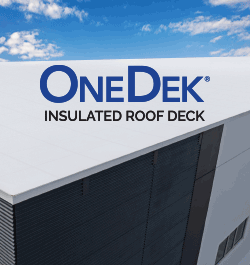
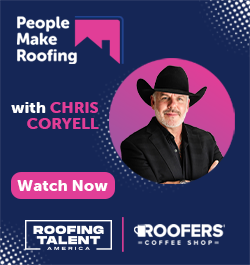


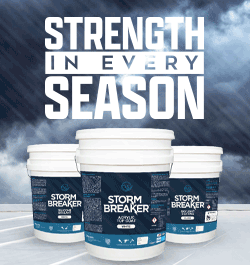







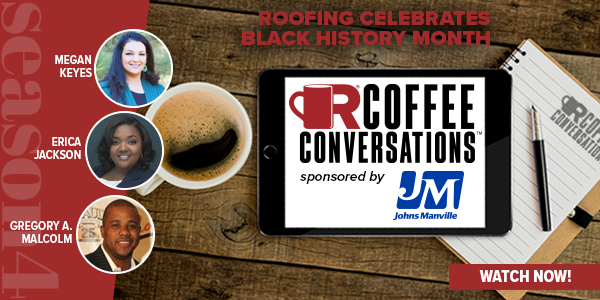
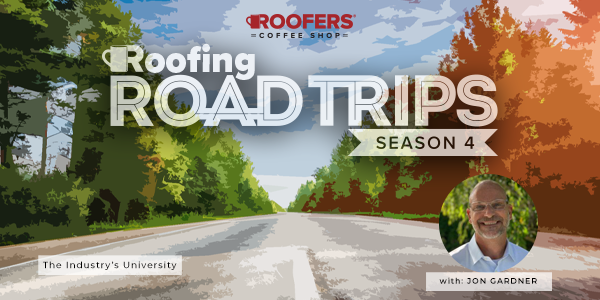
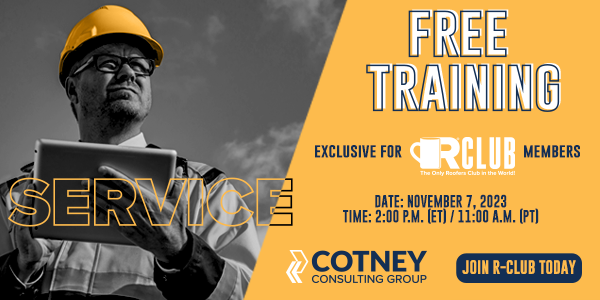
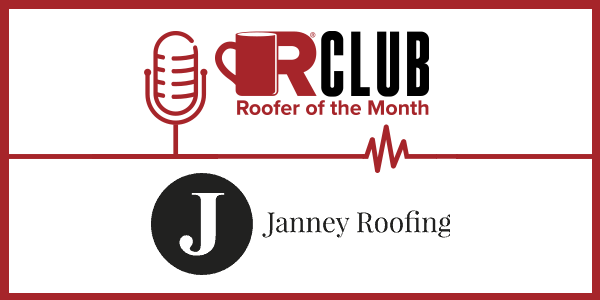

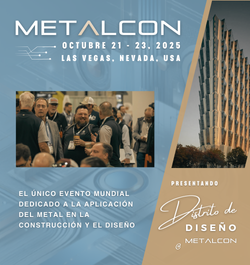

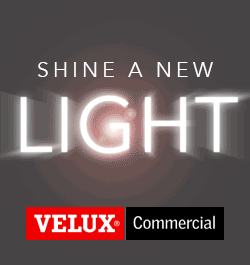


Comments
Leave a Reply
Have an account? Login to leave a comment!
Sign In